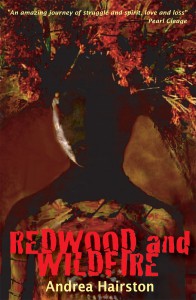Redwood and Wildfire by Andrea Hairston (Aqueduct Press, 2011) is the winner of the 2011 James Tiptree Jr. Award.

Redwood and Wildfire was a favorite of the jurors from the moment they read it. They reported: “This vivid and emotionally satisfying novel encompasses the life of Redwood, a hoodoo woman, as she migrates from rural Georgia to Chicago at the turn of the 20th century. While Redwood’s romance with Aidan Wildfire is central to the novel, female friendship is also a major theme, without deferring to the romance. Hairston incorporates romantic love into a constellation, rather than portraying it as a solo shining star. Her characters invoke a sky where it can shine; they live and love without losing themselves in cultural expectations, prejudices and stereotypes, all within a lovingly sketched historical frame.
“Intersections of race, class, and gender encompass these characters’ entire lives. They struggle with external and internal forces around questions of gender roles, love, identity, and sexuality. This challenge drives how they move through the world and how it sees them. The characters in Redwood and Wildfire deftly negotiate freedom and integrity in a society where it’s difficult to hold true to these things.”
This year’s jurors were Lynne Thomas (chair), Karen Meisner, James Nicoll, Tansy Rayner Roberts, and Nisi Shawl.
Honor List
In addition to selecting the winner, the jury chose a Tiptree Award Honor List. The Honor List is a strong part of the award’s identity and is used by many readers as a recommended reading list for the rest of the year. This year’s Honor List is:
Libba Bray, Beauty Queens (Scholastic Press 2011) — In this atypically comedic Tiptree candidate, a cast of iconic characters trapped on a hostile island (populated by the capitalist analog of Doctor No) illuminates the limited palette of roles for women and offers the hope of more rewarding and rounded lives.
L. Timmel Duchamp, “The Nones of Quintilus” (in her collection Never at Home, Aqueduct Press 2011) — This standout story addresses the relationships between mothers and daughters and how the world looks different when you become (or intend to become) pregnant.
Kameron Hurley, God’s War (Night Shade Books 2011) — Set on a marginally habitable world divided by a common religion with diverse interpretations, this engaging work explores a militaristic matriarchal society.
Gwyneth Jones, The Universe of Things (Aqueduct Press 2011) — Running through these gorgeous stories is a fierce awareness of how gender roles and other social power imbalances are always factors in how we think, how we approach one another, how we see the world. The author questions the status quo, and then questions the questioning, so what emerges is a mature, honest, thoughtful complexity.
Alice Sola Kim, “The Other Graces” (Asimov’s Science Fiction, July 2010) — This elegantly written short story revisits the role of mirroring in self-actualization and casts that path in a new and skiffy light as its heroine, Grace, is mentored by her older alternate selves. It also depicts racial/cultural intersections with gender roles.
Sandra McDonald, “Seven Sexy Cowboy Robots” (Strange Horizons, 2010.10.04) — A surreal and subversive take on human-AI relations. An older female character exploring her sexuality is a rare thing in science fiction, and it is refreshing to see it handled here with such a deft hand.
Maureen F. McHugh, “After the Apocalypse” (in her collection After the Apocalypse, Small Beer Press 2011) — This title story of an impressive collection brings to the foreground gender expectations concerning the practice of motherhood in extreme situations and then completely and matter-of-factly upends them.
Delia Sherman, The Freedom Maze (Big Mouth House 2011) — A clear-hearted, magically immersive time travel story that explores powerful ideas. Thrown back through time to an antebellum plantation, a thirteen-year-old comes to understand how women’s experience is shaped by cultural expectations as they interweave with social, economic, and racial truths.
Kim Westwood, The Courier’s New Bicycle (Harper Voyager Australia 2011) — This compelling novel depicts a variety of sexually transgressive characters and looks at themes of fertility and alternate family structures through a dystopic lens.
The jury also named a “long list” of books worth mentioning, which is available at the link at the top of this page.
